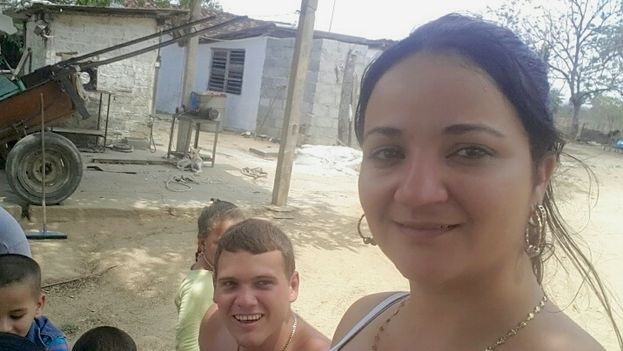
![]() 14ymedio, Reinaldo Escobar, Havana 16 September 2017 — Aimara Peña was a little over 16 when she enrolled in a degree to qualify as a primary school teacher, but in the last semester of the course she was expelled from the Pedagogical University of Sancti Spiritus for her incipient political activism.
14ymedio, Reinaldo Escobar, Havana 16 September 2017 — Aimara Peña was a little over 16 when she enrolled in a degree to qualify as a primary school teacher, but in the last semester of the course she was expelled from the Pedagogical University of Sancti Spiritus for her incipient political activism.
Now, the young woman seeks to represent her constituency as a delegate to the People’s Power. To achieve this, she will have to be proposed at one of the nomination meetings for candidates in the Las Pozas community, where she lives with her husband and two children, aged four and nine.
Peña has extensive experience in the reporting of human rights violations, the exercise of citizen journalism and work as an independent librarian. Works that have allowed her to know the exigencies of her neighbors.
Six kilometers from the provincial capital, Las Pozas, with 2,000 in habitants, has bus service only until six in the afternoon and lacks private carriers to alleviate the situation. The activist intends to seek a solution to this problem if she is elected.
Aimara Peña joined the Network of Electoral Facilitators whose main purpose is to ensure that citizens – ones with the will to represent the true interests of the population – occupy positions in these basic structures of People’s Power.
“The idea of being a delegate always appealed to me,” explains the young woman who, at just 27, decided to run “to show that the work we do as activists is completely legal.”
With her attitude she also wants to motivate those people whom she energized to participate in the electoral process. “They are afraid and some are also undecided, so I wanted to set the example.”
The spiritual activist is dedicated “to listening to everything citizens have to say.” She believes that “at present the functions of the delegates are very limited despite being public figures in direct contact with the population and the only one that Cubans elect [directly].”
Peña is convinced that his main duty “is to help make the role of the district delegate a truly important one.” Until now the authorities use it as a channel to transmit information to the people but the delegate must work to “demand from the government what the people want,” she explains. “We have to start reversing that equation.”
Peña knows what she is facing. Although she has not received direct threats so far, not even an “unofficial visit,” she has received signals that the Party and Government organs are trying to deal with her candidacy by spreading negative rumors about her.
Something that does not kill her dream: “I think I have all the qualifications to present myself, and at least until now they have respected that, I hope that during the assembly, which still has no fixed date, things continue as before.”
In the Nominating Assembly, voters will have vote by an open show of hands and the fear of reprisals can have a negative effect.
“To some extent, many people close to me feel a little fear, because this is a decision that also involves the family, but my parents and my husband support me, they have been a pillar to strengthen me,” says the enthusiastic young woman.
If, in addition to being proposed, she manages to get the majority of hands to raise for her in that assembly, the name of Peña will appear on a ballot. Her photo and biographical data will be displayed in the same electoral district where a ballot box will collect the sentiment of the 754 voters of Pozas’s District 23.
“A lot of people will be afraid to raise their hands in my favor in the assembly, but once that barrier is overcome, the chances will be greater with the secret ballot.” She doesn’t doubt that if her name reaches the secret ballot in the next round her neighbors will vote for her. “All this, what I have been working for so long, will bear fruit,” she said.
